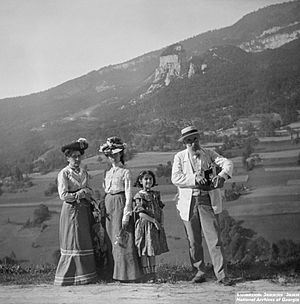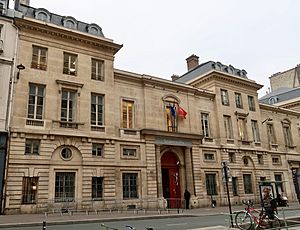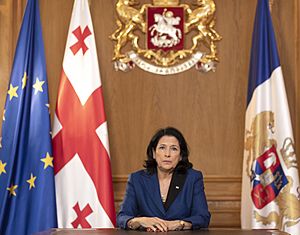Salome Zourabichvili facts for kids
Quick facts for kids
Salome Zourabichvili
|
|
|---|---|
|
სალომე ზურაბიშვილი
|
|
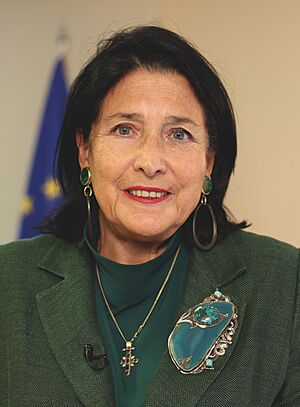
Zourabichvili in 2024
|
|
| 5th President of Georgia | |
| In office 16 December 2018 – Disputed |
|
| Prime Minister | |
| Preceded by | Giorgi Margvelashvili |
| Succeeded by | Mikheil Kavelashvili (disputed) |
| Minister of Foreign Affairs | |
| In office 20 March 2004 – 18 October 2005 |
|
| President | Mikheil Saakashvili |
| Preceded by | Tedo Japaridze |
| Succeeded by | Gela Bezhuashvili |
| Leader of The Way of Georgia | |
| In office 11 March 2006 – 12 November 2010 |
|
| Preceded by | Party established |
| Succeeded by | Kakha Seturidze |
| Member of the Parliament of Georgia | |
| In office 18 November 2016 – 22 December 2018 |
|
| Preceded by | Zaza Papuashvili |
| Succeeded by | Lado Kakhadze |
| Parliamentary group | Independent |
| Constituency | Mtatsminda |
| Ambassador of France to Georgia | |
| In office 11 September 2003 – 20 March 2004 |
|
| President | Jacques Chirac |
| Preceded by | Mireille Musso |
| Succeeded by | Philippe Lefort |
| Personal details | |
| Born |
Salomé Zourabichvili
18 March 1952 Paris, France |
| Citizenship |
|
| Political party |
|
| Other political affiliations |
Georgian Dream (2018) |
| Spouses |
|
| Children | 2 |
| Relatives |
|
| Education | |
| Signature | |
Salomé Nino Zourabichvili (born 18 March 1952) is a Georgian politician who became the fifth president of Georgia. She was born in France and worked as a diplomat for many years. She is the first woman ever to be elected president of Georgia.
Zourabichvili was the last president of Georgia to be chosen directly by the people in a popular vote. Because of changes to the country's constitution, future presidents are now chosen by a special group called the Georgian Electoral Assembly.
Born in Paris to a family of Georgian political refugees, Zourabichvili joined the French diplomatic service in the 1970s. She held many important diplomatic jobs over three decades. From 2003 to 2004, she was the Ambassador of France to Georgia.
In 2004, she became a Georgian citizen and was appointed the Foreign Minister of Georgia. In this role, she helped negotiate a deal for Russian soldiers to leave Georgian territory. After disagreements with the ruling party, she started her own political party in 2006. In 2018, she ran for president as an independent candidate and won.
During her presidency, she had growing disagreements with the ruling Georgian Dream party. This led to a major political crisis in 2024. After a disputed election chose a successor, Zourabichvili stated she would remain president until a fair election could happen.
Contents
Early Life and Family
Growing Up in France
Salome Zourabichvili was born in Paris, France. Her family had fled Georgia in 1921 after the Soviet Red Army invaded. Her father, Levan, was an engineer. Her great-grandfather was Niko Nikoladze, a famous Georgian politician and writer in the 19th century.
Zourabichvili grew up in the Georgian community in France. She said that for a long time, Georgia was like a "mythical country" to her that she only knew from books. She went to French schools but also attended the Georgian church in Paris on weekends.
Education and Early Career
Zourabichvili was a very smart student. She studied at the famous Sciences Po university in Paris from 1969 to 1972. She focused on the Soviet Union and international relations. After graduating, she studied at Columbia University in the United States.
She decided to become a diplomat because she hoped to one day help Georgia. In 2006, she returned to Sciences Po as a professor, teaching about international politics.
Personal Life
Zourabichvili has two children, Kéthévane and Teymouraz, from her first marriage. Her second husband, Janri Kashia, was a Georgian writer who passed away in 2012. She speaks French, Georgian, and English fluently.
Career as a Diplomat
Zourabichvili began her career as a French diplomat in 1974. She worked in many different countries.
- 1974–1980: She worked in Rome, Italy, and at the French Mission to the United Nations in New York.
- 1984–1988: She was the First Secretary at the French Embassy in Washington, D.C., focusing on relations between the U.S. and the Soviet Union.
- 1989–1992: She served as an adviser at the French Embassy in Chad, a country in Africa.
- 1992–1996: She worked with NATO and the Western European Union in Brussels, Belgium.
In 2003, she was appointed as the French Ambassador to Georgia. This was a very important step in her career.
Georgian Political Career
Minister of Foreign Affairs
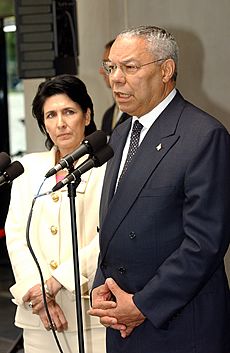
In 2004, Georgian President Mikheil Saakashvili asked Zourabichvili to become the Minister of Foreign Affairs. She became the first woman to ever hold this job in Georgia.
As Foreign Minister, she worked on a major agreement to have Russian military bases removed from Georgia. She also helped create a group of friendly countries to support Georgia's goal of joining NATO and the European Union.
However, she had disagreements with some members of Parliament and was dismissed from her job in October 2005. She decided to stay in Georgia and start a career in politics.
Path to the Presidency
In 2006, Zourabichvili started her own political party called The Way of Georgia. For several years, she was a key figure in the opposition, often criticizing the government.
In 2016, she was elected to the Georgian Parliament as an independent member. She represented the Mtatsminda district of Tbilisi.
In 2018, she decided to run for president. She ran as an independent candidate but was supported by the ruling Georgian Dream party. She had to give up her French citizenship to run, as the Georgian constitution does not allow the president to be a dual citizen.
Zourabichvili won the election in the second round with over 59% of the vote. She became the first female president in Georgia's history.
President of Georgia
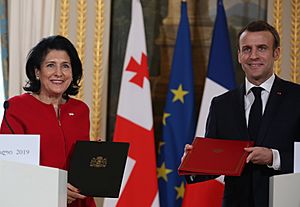
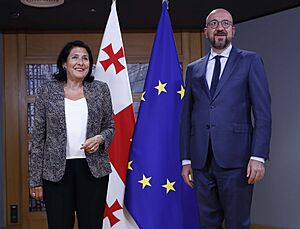

Zourabichvili's inauguration took place on December 16, 2018. As president, she moved her office to the Orbeliani Palace, a smaller residence in Tbilisi, to save money.
Foreign Policy
As president, Zourabichvili traveled to many countries to represent Georgia. She met with world leaders to strengthen Georgia's relationships with other nations. She often spoke about the importance of Georgia joining the European Union and NATO.
When Russia invaded Ukraine in 2022, she strongly supported Ukraine. She also helped submit Georgia's official application for EU membership.
Disagreements with the Government
Over time, Zourabichvili's relationship with the ruling Georgian Dream party became difficult. They disagreed on many issues, especially on foreign policy and laws related to democracy.
In 2023, the government tried to impeach her, which means removing her from office. They said she traveled abroad without their permission. The impeachment attempt failed because they did not get enough votes in Parliament.
The 2024 Political Crisis
In 2024, the government passed a controversial "foreign agent law." Many Georgians protested against it, saying it was similar to a Russian law used to silence critics. Zourabichvili supported the protesters and vetoed the law, but Parliament overturned her veto.
She helped unite opposition parties by creating the Georgian Charter. This was a plan to work together for a more democratic and pro-European future for Georgia.
After the parliamentary elections in October 2024, the Georgian Dream party was declared the winner. However, Zourabichvili and opposition parties said the election was fraudulent. She refused to recognize the results and called for mass protests.
The government announced it was pausing talks to join the EU until 2028. Zourabichvili called this decision a betrayal of the country's goals. When her official term ended in December 2024, she stated she would not step down. She said she would remain the legitimate president until new, fair elections could be held.
Many international leaders, including some in the U.S. and the European Parliament, recognized her as Georgia's legitimate leader.
Political Positions
Women's Rights
As Georgia's first female president, Zourabichvili has often spoken about the importance of women's rights and equality. She believes that women's contributions are key to the country's development.
LGBTQ+ Rights
Zourabichvili has stated that no one should be discriminated against because of their sexual orientation. She has condemned violence against LGBTQ+ people and has said that everyone has the right to express their opinion peacefully.
Foreign Agent Law
Zourabichvili strongly opposed the "foreign agent law" passed in 2024. She said the law was "fundamentally Russian" and went against Georgia's constitution and European values. She vetoed the law, but her veto was overturned by the parliament.
Images for kids
-
Zourabichvili with Nancy Pelosi
-
Salome Zourabichvili, Maia Sandu, Volodymyr Zelenskyy, and Charles Michel during the 2021 International Conference in Batumi.
-
Orbeliani Palace is the official presidential residence in Tbilisi.
-
Zourabichvili addressing a pro-EU rally in Tbilisi, 20 October 2024.
-
Zourabichvili addressing the European Parliament, 18 December 2024.
Foreign honors
| Ribbon bar | Country/Entity | Honor |
|---|---|---|
| France | Chevalière of the National Order of the Legion of Honour (2003) | |
| France | Officière of the Ordre national du Mérite | |
| Italy | Knight of the Order of the Star of Italy (1978) | |
| Italy | Knight Grand Cross with Collar of the Order of Merit of the Italian Republic (2022) | |
| Greek Orthodox Patriarchate of Jerusalem | Great Cross of the Order of Orthodox Cross-Bearers of the Holy Sepulchre (2020) | |
| Cyprus | Grand Collar of the Order of Makarios III (2021) | |
| Moldova | Order of the Republic (2025) |
Works
- Une femme pour deux pays ["A Woman for Two Countries"] (2006)
- საქართველოსკენ ["Toward Georgia"] (2005)
- Les cicatrices des nations ["The Scar of Nations"] (2008)
- La tragédie géorgienne ["The Georgian Tragedy"] (2009)
- L’exigence démocratique ["The Democratic Necessity"] (2010)
See also
 In Spanish: Salomé Zurabishvili para niños
In Spanish: Salomé Zurabishvili para niños
 | Shirley Ann Jackson |
 | Garett Morgan |
 | J. Ernest Wilkins Jr. |
 | Elijah McCoy |


